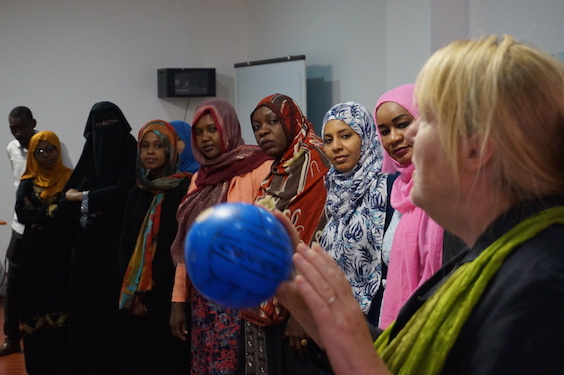 Trainer Dr. Stella van Beers (r) in an ice-breaking exercise with participants (Photo: Linda Oskam/DATOS)
Trainer Dr. Stella van Beers (r) in an ice-breaking exercise with participants (Photo: Linda Oskam/DATOS)
13 September, 2017 - Today, Khartoum marked the fourth day of a Management and Leadership Training in Laboratories, where a very enthusiastic class of lab directors, managers and quality officers from all over Sudan learned about effective management and leadership from two laboratory quality and systems experts.
The expert trainers, Dr. Linda Oskam (54), Director of the DATOS advisory agency on lab strengthening, and Dr. Stella van Beers (66), lab quality management systems and epidemiology expert, note the key importance of strong laboratories for a well-functioning health system. Dr. Oskam: “Labs are like the eyes of the medical sector. Without them, neither clinical nor public health facilities can see.” A lab can tell policymakers and public health leaders exactly what is going on - for example whether a tuberculosis outbreak is resistant to certain drugs or not. “This improved data then informs a much more focused response, which saves money - but more importantly, saves lives,” said Dr. Oskam.
The training will help to strengthen Sudan’s labs by making the participants better leaders and managers. Dr. Oskam: “Lab managers are normally technically strong, but not necessarily good managers as formal management training is missing. Although you can’t make perfect managers in just a few days, our course does provide a broad introduction into a lot of management skills and topics.”
The subjects covered include quality and risk management, personnel management, planning, budgeting and evaluation, and “soft” management skills focusing on giving effective feedback to people, delegating, communicating and active listening.
Dr. van Beers: “The class is highly motivated and active. One thing that struck me was that all of the participants agreed independently that soft management skills can have a huge impact, while costing little time and money.”
In the Sudanese public sector, especially in remote areas, planning is another crucially important dimension of proper lab management. Dr. Oskam: “In the private sector, you can order supplies and they will often arrive the next day. In the public sector, things tend to take a little longer. So, as a lab manager you also need to look ahead much further, sometimes even six months.”
Once the participants go back to their states, they will not only strengthen the central state laboratories, but also apply their new knowledge and skills to local labs and officers. In addition, there is a budding plan to create a postgraduate programme on laboratory management and leadership, which would be one of only few in the world. Dr. Oskam: “In Sudan’s national laboratory policy there is a key mention of improving lab management quality. To achieve that goal, you need more than a week long training. So the postgrad would definitely be a big step forward, for Sudan and for the region as well.”





